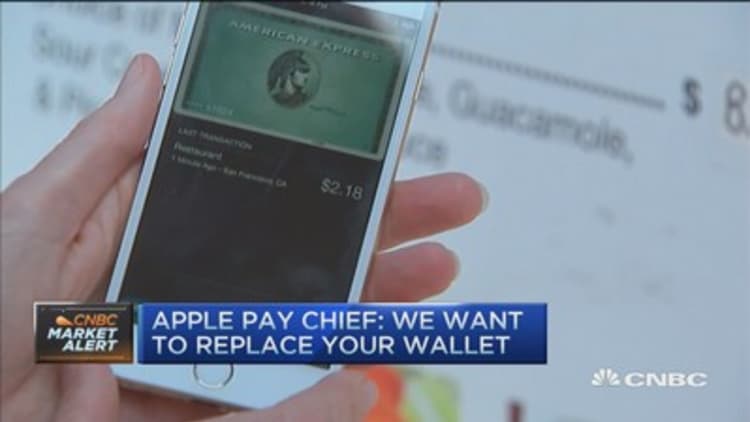
On the company's last earnings call, Apple CEO Tim Cook said Apple Pay is on track to be accepted at more than 1.5 million U.S. locations by the end of the year. On Thursday, the tech giant announced news that could help it achieve that goal.
Apple's mobile payments service will now work with PayAnywhere, a credit card reader serving 300,000 locations across the country. The newest version of the PayAnywhere reader will be available exclusively in Apple Stores nationwide.
"We are very excited to launch sales exclusively in Apple Stores throughout the country," said Marc Gardner, CEO of PayAnywhere, in a statement. "To demonstrate how simple and easy it is to accept Apple Pay, we have chosen to offer all customers the first $5,000 free in Apple Pay transaction processing with a new PayAnywhere account."
With this mobile payments solution, Apple is betting that consumers will no longer want to carry their wallets, credit cards or cash. Instead, they'll opt for a method of payment that Apple bills as faster, easier and more secure.
Users walk up to a checkout line while holding their iPhone 6 or iPhone 6 Plus up to a special reader. By simply pressing the fingerprint sensor, the transaction is completed. (Apple Pay is also compatible with Apple Watch).
Apple is trying to capitalize on a fast-growing market. Consumers made $52 billion in mobile payments last year, according to Forrester Research. That will ramp up to $142 billion by 2019, Forrester predicts.
That kind of growth has encouraged a range of tech titans to move hard and fast into this space: Both Android Pay and Samsung Pay (from Google and Samsung, respectively) are to be released soon. But Jennifer Bailey, head of Apple Pay, told CNBC that she is not concerned about that competition.
"I think we have the best customer experience out there," Bailey said. "And I think we have the most secure solution in terms of protecting people's privacy and their credit card information."
One potential challenge for Apple is attracting merchants to the service. To make Apple Pay work, stores have to install what's called an NFC reader (for near-field communication) at the checkout line.
However, James Wester, a research director at IDC, points out that hurdle is being addressed as merchants upgrade their terminals. Wester says that more than 75 percent of terminals shipped last year—around 2.2 million—came equipped with NFC capabilities.
Apple Pay will also continue to evolve as a product, said Bailey. For instance, she didn't rule out the possibility that Apple might make the service compatible with buying online through a desktop browser and take on PayPal, or even offer peer-to-peer payment services.
"We don't talk about what we're doing in the future," Bailey told CNBC. "But we want Apple Pay to be very broadly accepted in all the types of transactions that customers do today."



